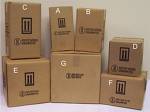
“Ward Dear… I’m worried about the Beav…” I can still picture her dressed neat as a pin in her meticulously clean home, hair done up but not overstated; pearls and modest healed pumps adding a demure touch of class and her frilled apron a dash of wholesomeness as she stood with a plate of freshly baked cookies. June Cleaver… the perfect wife and mother. As a young girl, I knew that someday I would be a mom just like her.
My current day perfect mother role models are the real-life moms who “never let you see them sweat.” Perhaps a hidden camera would reveal something all together different, but from my vantage point, superimpose a 19” screen around them and I see June Cleaver in contemporary clothes. Take for example my neighbor and dear friend, Loraine.
She works as a nurse several nights a week, pulling into or out of her driveway in the dead of night.
She has two children, a husband, a dog and a beautiful home that would proudly welcome a spontaneous visitor at any time.
Her hair is always perfect, her laundry always done and put away, her children always sparkle and her car is in showroom condition.
.
Her garage is immaculate, dinner is always ready and on the stove, she is always at least 15 minutes early and she never raises her voice.
Her children are involved in many quality programs, they go to church every Sunday and her garbage cans never stay out more than one hour after the trash is picked up.
.
I’d like to say the only difference between us is that I have one more child and a cat, or that having those additions explains why a visit to my home requires one hour notice for me to scramble franticly to make the house presentable. But, I’m afraid it is more than that.
My hair is always pulled back and loose strand jump out everywhere as if to broadcast that I do not have it all together.
My laundry is always in the process of being done with one load in the washer, one in the dryer, one on the kitchen island waiting to be folded, one at the foot of the stairs in a basket waiting to go up, and one upstairs waiting to be put away. The choreography is quite something and as one load finishes the wash cycle, each load shifts forward one position, almost by itself.
My children normally sport holes in the knees and have one or the other row of teeth brushed.
My car would be a jackpot for a drive thru version of “Let’s Make A Deal” as one can find almost anything from fossilized French fries to bibles.
My garage is the home of unwanted things that my quintessential “middle-child” husband “might need someday,” and therefore it cannot house cars.
.
Dinner is never ready, we are always 15 minutes behind schedule, and my children are so accustomed to yelling that they only hear me when I whisper.
My kid’s extracurricular activities seem to add stress instead of well-roundedness, we’re two for four on Sundays at church, and my garbage cans have a 24 hour after pick up minimum.
Even my own mother, though not June Cleaver, had a better handle on running the family. Home cooked meals were ready at 5:00 when Dad arrived home, the laundry was done, and her four children were involved in at least eight activities collectively. Living today in the point and click information age should bring ease for me, but something about life seemed simpler back then. When my mother said she had eyes in the back of her head, I believed her and wouldn’t have dreamed of rummaging around her scalp for proof. When she said “If I have to stop this car…” I believed that life as I knew it would be over if she did. I never once recall informing her that hitting children was against the law.
Even though I know that June was made out of completely different fabric, I still can’t seem to let go of trying to fill her shoes. Just recently on “Crazy Tuesday” I took my best shot. On crazy Tuesday I watch my neighbor’s children until 5:00 and then pick up the sitter and head to work myself. I try on those days to have dinner made and on the stove by noon, work clothes ready to jump into, and a freshly baked snack ready for the three big kids returning home from a day in the trenches.
On this particular Tuesday, I felt that I had it all together and minus the apron, I was hot on June’s heels with freshly baked chocolate chip cookies, a glass of milk, a napkin and a neatly sharpened pencil for each child arranged at the kitchen island. I had sincerely believed that I could fill their little tummies and supervise their homework in this tranquil environment in the 40 minutes I had before dressing and picking up the sitter. I greeted them at the door and was as cheerful as June on her best day, minus the pearls. “Hi guys! How was your day?”
I was nearly knocked over by flying backpacks and a flurry of coats and shoes and they vanished. I took only a minute to coral the shoes, hang up the coats, pile the backpacks and I waltzed, minus the modest heeled pumps, to the kitchen. If I did have my hair neatly done but not overstated, it would have fallen out at a mere glance into the room. Crumbs flying like nuclear fallout, milk spilled, a “you took my cookie” argument and a pencil swordfight made me sure of one thing, June used tranquilizers… on her children. After eight and a half years in this most rewarding of jobs, I was beginning to realize that I was doing something wrong.
Now occasionally I receive complements on my mothering. “I just don’t know how you do it!” From outside, they see a soccer mom, room mother and a person who smiles while driving even when all six passenger seats of her van are filled with little heads. It began to occur to me that the rest of the world doesn’t know that I’m not June material. As long as they don’t see behind the scenes, perhaps I could be satisfied with a June-like reputation, even if it is a façade. This idea placated me for a while and I was able to put my June quest to rest.
As usual, when it is most impossible and all odds are stacked against me, June rears her ugly head, most recently during a nasty bout of the flu.
Day one in a fever haze I rose from the couch to fold laundry, make my husband lunch (which I don’t do when I’m feeling well) and attempted to vacuum. No one in the house tried to stop me. My husband has surrendered to my stubborn Irish will and my children quite honestly would fully expect me to rise from the dead each morning to make them breakfast .
Day two I did laundry cleaned the bathrooms and read stories to the children.
Day three I actually got up to bake peanut butter and chocolate chip cookies. By that afternoon, I could have killed June and I collapsed on the couch defeated.
My husband came home and fed the children dinner (fish sticks and chicken soup) and leaving the kitchen a mess, ran an errand of mercy to buy “sneezing, coughing, fever, aching so you can rest” medicine. No sooner had he left when the unthinkable happened. The behind the scene cameras caught me live!
If you put an intellectual and contemporary twist on June, she would be named Roz and low and behold, she stopped by to drop something off for a project our sons were working on together. Roz very efficiently runs a big family (four children) in a big house on her husband’s big income and has a home environment that child development experts would use as a model: anti-violent, hypo-allergenic, proactive and politically correct. Her husband coaches sports, she plays tennis, and they are both active in school and community. Her children were always on the honor list, serve the student council and sport advertisement quality attire at all times. This is surely the type of person I require a one hour notice for on my best day.
I quickly surveyed the area as she rang the doorbell and became acutely aware of the fish stick/chicken soup aroma. Dishes spilled out of the kitchen sink and an earlier attempt at the laundry ballet left two unfolded baskets as a homey centerpiece on the dining room table. But the living room! This was the heart of the madness with me as the main exhibit.
Having not showered or combed my hair, I was looking especially ravishing lying among the crumpled blankets, a folded up dirty diaper nestled beside me that I just couldn’t get to the trash. Toys were strewn about as if an entire daycare left in a hurry. Cups of milk and crumbled cookies represented the self serve dessert my children had arranged. Shoes and jackets lay exactly where children shed them, in the doorway and I noticed the glass paned door entering our home was smeared with something that was likely at one time edible. The TV roared with an inappropriate cartoon that I’m certain Roz has banned. The vacuum lay among the rubble laughing at me for having dragged it out in the first place, and a roll of toilet paper I had been using as tissue was artfully rolled across the room.
As I heard Tyler open the front door and say “come in” I waved wildly to the children to signal that I could not have company—germs were everywhere!
“Don’t come in, I have the flu,” I squeaked, hoping that she would back out quickly without getting a chance to take it all in.
No such luck!
She had a flu shot of course.
Her son dashed up the stairs with Tyler to his room, which I later learned looked much like his father’s garage.
“Oh honey,” Roz oozed with sympathy, lips puckered head shaking back and forth “what can I do to help?” As she proceeded to roll up her sleeves and the roll of toilet paper, my hopes of a June façade quickly evaporated. “Let me at least put the vacuum away. Where does it go?” she said with a pouty frown, head tipped to show she felt my pain.
It pretty much roams room to room, I thought to myself as vacuuming, like the laundry, is a process never finished. She stayed long enough for whatever self esteem I had to surrender with my body to the flu and as she blew little kisses good-bye to Cadence through the food encrusted glass paned door, I knew once and for all, June Cleaver doesn't live here.











